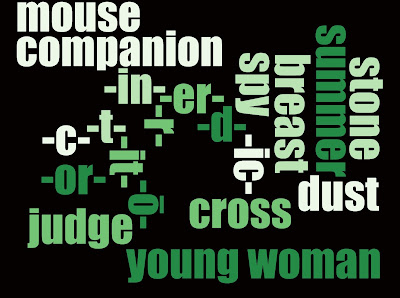Dē diē ac nocte
Lūx diēs vocātur. Obscūritās nox appellātur. Manē aurōra rubēscit. Stēllae ēvānēscunt. Lūcēscit. Diēs fit. Sōl oritur. Illam partem caelī Orientem appellāmus. Diēs ad labōrem datur. Sōl tōtō diē in caelō lūcet. Mediō diē sōl altus in caelō vidētur. Illam partem caelī Merīdiem vocāmus. Medius diēs et merīdiēs dīcitur. Multō diē advesperāscit. Sōl occidit. Illam partem caelī Occidentem dīcimus. Post occāsum sōlis caelum obscūrum fit. Stēllae iterum lūcēscunt. Nox fit. Nox ad quiētem datur. Vesperī lūna plēna ab oriente oritur. Haec tōtā nocte in caelō lūcet. Mediā nocte alta in caelō vidētur. Māne ab occidente occidit. Stēllae quoque ab oriente orīrī videntur. Hae aut ab occidente cadunt, aut ortū sōlis ēvānēscunt.
Four types of verb:
[i] active verbs
[ii] passive verbs
[iii] deponent verbs
[iv] inchoative verbs; those are the verbs with the tell-tale -sc- in the stem that show change / the beginning of a change i.e. x is becoming y.
And …
[v] the verb: fiō (to become); more on this verb in a later post
[A] Complete the translations with the words listed below.
- Lūx diēs vocātur. │ The light __________ day.
- Obscūritās nox appellātur. │ The darkness __________ night.
- Manē aurōra rubēscit. │ In the morning the dawn __________ red.
- Stēllae ēvānēscunt. │ The stars __________ [= are fading away i.e. a process of change].
- Lūcēscit. │It is __________ light.
- Diēs fit. │It is __________ day.
- Sōl oritur. │ The sun is __________.
- Illam partem caelī Orientem appellāmus. │ __________ that part of the sky the East.
- Diēs ad labōrem datur. │ The day __________ (over) to work.
- Sōl tōtō diē in caelō lūcet. │ The sun __________ all day in the sky.
becoming; disappear;
getting; is called; is called; is given; rising; shines; turns; we call
[B] Complete the
translations with the words listed below.
- In the middle of the day the sun is seen high in the sky. │ Mediō diē sōl altus in caelō __________.
- We call that part of the sky the South. │ Illam partem caelī Merīdiem __________ [2 possibilities].
- The middle of the day is also called noon. │ Medius diēs et merīdiēs __________.
- Late in the day it starts to become evening. │ Multō diē __________.
- The sun is going down / setting. │ Sōl __________.
- We call that part of the sky the West. │ Illam partem caelī Occidentem __________ [2 possibilities].
- After sunset the sky becomes dark. │ Post occāsum sōlis caelum obscūrum __________.
- The stars begin to shine again. │ Stēllae iterum __________.
- It becomes night. │ Nox __________.
- The night is given (over) to rest. │ Nox ad quiētem __________.
advesperāscit;
datur; dīcimus; dīcitur; fit; fit; lūcēscunt; occidit; vidētur; vocāmus
[C] Complete the
translation of the rest of the text; some words are used more than once.
Vesperī lūna plēna
ab oriente oritur. │ In the [1] __________ a full [2] __________ [3] __________
from the [4] __________.
Haec tōtā nocte in
caelō lūcet. │ It [5] __________ in the [6] __________ the whole [7] __________.
Mediā nocte alta
in caelō vidētur. │ At [8] __________ it [9] __________ high in the [10] __________.
Māne ab occidente
occidit. │ In the [11] __________ it [12] __________ from the [13] __________.
Stēllae quoque ab
oriente orīrī videntur. │ [14] __________ are also [15] __________ [16] __________
from the [17] __________.
Hae aut ab
occidente cadunt, aut ortū sōlis ēvānēscunt. │ These either [18] __________ from
the [19] __________ or [20] __________ at [21] __________.
east; evening; fade away; fall; goes down; is seen; midnight; moon; morning; night; rises; rising; seen; shines; sky; stars; sunrise; west































